Magistrale 2013 – In the Name of Energy

© Alain Herzog / EPFL
They endured sleepless nights preparing their exams, they may have complained, but they didn’t give up. With pride and with relief, this year’s record 818 graduates received their well-deserved Master’s degree. Among them, the very first class of energy managers. The day began with the creation of a giant human puzzle on the theme of wind energy.
2013 was an important year: a record-breaking 818 students received their Master’s degree, 17 of which became the first engineers in energy manage ment and sustainability to graduate from EPFL. Over 3500 people, including State Councilor Jacqueline de Quattro, professors, and the graduates’ families and friends, came together for the ceremony, held for the last time in a packed circus tent on Place Cosandey. Starting next year, the event will be carried out in EPFL’s new convention center. Jazz-musician Yaron Herman added a musical backdrop to the ceremony.
ment and sustainability to graduate from EPFL. Over 3500 people, including State Councilor Jacqueline de Quattro, professors, and the graduates’ families and friends, came together for the ceremony, held for the last time in a packed circus tent on Place Cosandey. Starting next year, the event will be carried out in EPFL’s new convention center. Jazz-musician Yaron Herman added a musical backdrop to the ceremony.
Philippe Gillet, ad interim president of EPFL during Patrick Aebischer’s sabbatical leave, opened the ceremony, explaining to the graduates that “the risk is to think that solutions are merely technological. They are never entirely technological. Often they are financial, sometimes they are cultural. They are always human.”
This year’s ceremony recognized the work of the first 17 students to receive a Master’s degree in energy management and sustainability. This new program, set up two years ago in partnership with EPFL Middle East, prepares future engineers for one of the most pressing challenges of our time: securing our growing energy needs. Franco Vigliotti, dean of EPFL Middle East, and Maher Kayal, director of the new Master's program, underscored the quality of the scientific and industrial interactions that were in put place for the program. A majority of the students enrolled seized the opportunity to pursue internships, research projects, or their Master’s theses with partners in the United Arab Emirates.
Link to a video about the master's program
Live art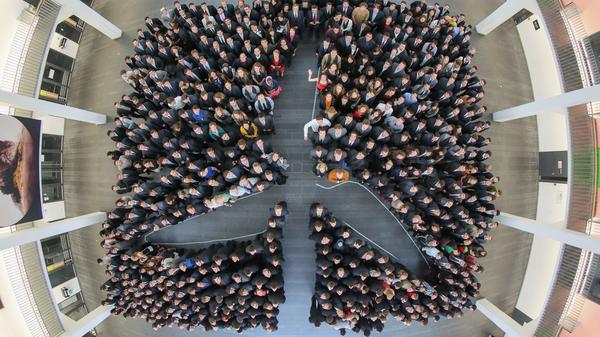
The day began early for the graduates, who lent themselves to an unusual artistic performance. Starting at nine in the morning, hundreds of students crowded together to form a giant human wind turbine. In less than an hour, the approximately 800 participants took their positions, contributing to the success of the shot. The photograph, fitting for our times, will soon be published.
The 2012 honorary doctorates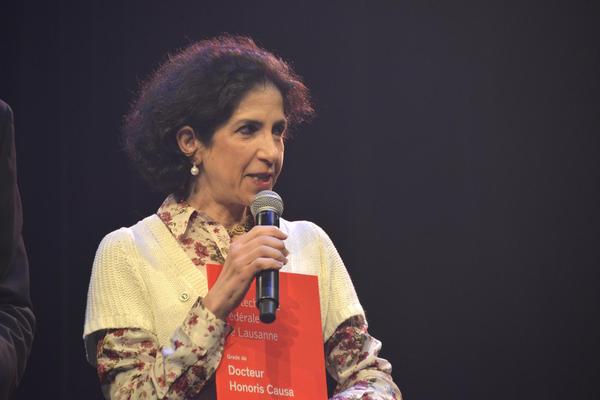
Fabiola Gianotti is a particle physicist. At the helm of “ATLAS,” one of the world’s largest research projects, she leads a team of 3000 physicists working on the Large Hadron Collider at CERN. She also played a key role leading up to the discovery of the Higgs Boson.
John A. Rogers is a physical chemist and materials scientist at the University of Illinois in Urbana-Champaign. With his team of researchers, he seeks to understand and exploit the unique properties of soft materials, such as polymers, liquid crystals, and biological tissues, and to develop hybrid combinations of them.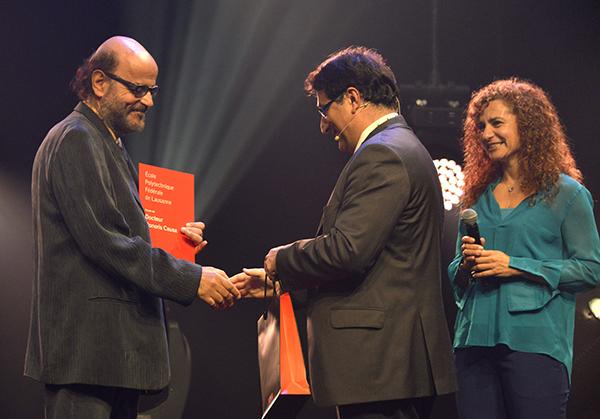
Christos Papadimitriou is a professor in computer science and became renowned for his contributions in the field of algorithmic complexity, databases, and combinatorial optimization. Currently a teacher and researcher at the University of Berkeley, California, he is the author of several books, most prominently of Computational Complexity, and arguably most intriguingly, of Turing, a modern love story centered around computation. More recently, he has taken to writing non-scientific novels as well, the first of which is Independence.
EPFL pays tribute to its alumni's careers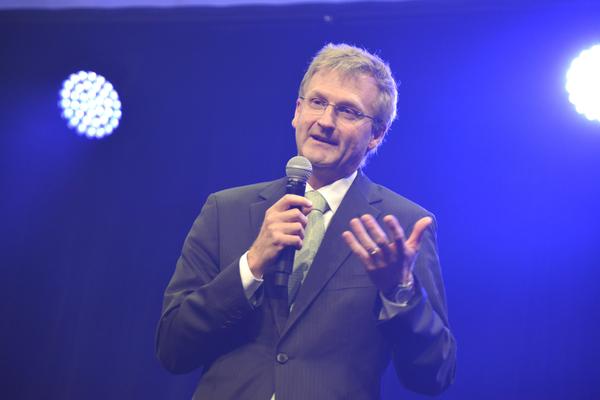
Jacques Baur, Director of research at Rolex SA, received his diploma in semi-conductor physics in 1981. He went on to pursue a PhD thesis, which he defended in experimental physical metallurgy. In 1994, he began his career at Rolex, setting up the materials research department. In 2007, he was named director of R&D at Rolex. As a member of the directing committee of the CCMX, Jacques Baur continues to promote the training of engineers at EPFL.
Christian Posse,Program manager for technology at Google, graduated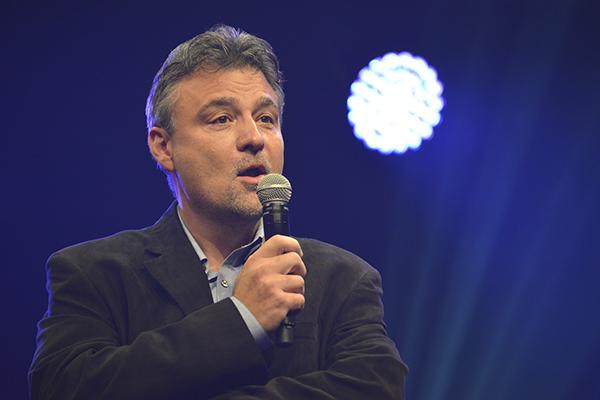 from EPFL with a diploma in mathematics in 1988. He received his doctorate in 199 before moving on to Stanford to pursue a postdoc funded by the National Science Foundation. A few years later, he decided to apply his research to real problems, and went on to become an expert in data-mining, working for several start-up companies. His algorithms and his models are predecessors of social networks that boomed in the following years. Christian Posse’s exceptional career includes engagements with Cisco, Linkedin, and then Google.
from EPFL with a diploma in mathematics in 1988. He received his doctorate in 199 before moving on to Stanford to pursue a postdoc funded by the National Science Foundation. A few years later, he decided to apply his research to real problems, and went on to become an expert in data-mining, working for several start-up companies. His algorithms and his models are predecessors of social networks that boomed in the following years. Christian Posse’s exceptional career includes engagements with Cisco, Linkedin, and then Google.
EPFL offered each invited alumni and honorary doctor a caustic glass plate carrying their effigy. At first glance, they look like simple transparent acrylic plates with nothing embedded within them or printed on their surface. But place them at the right angle between a white wall and a light source, and lo and behold, a clear and coherent image appears on the wall. There’s no magic here; the only thing at work is the relief on the plaque’s surface and a natural optical phenomenon known as a “caustic,” which researchers in EPFL’s Computer Graphics and Geometry Laboratory have succeeded in bending to their will.
Link to a clip about the caustic glass plates
The 2013Polysphere d’Or Teaching Award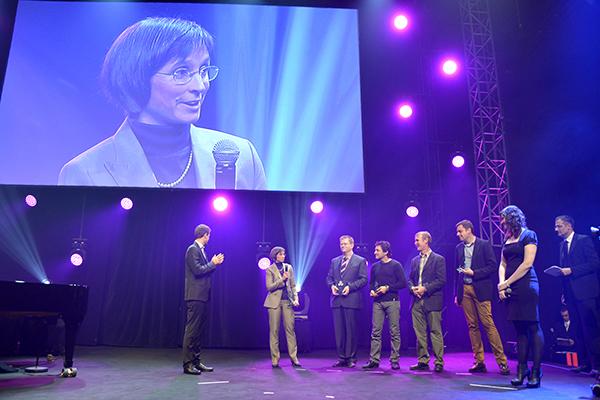
went to Kathryn Hess Bellwald, professor in mathematics, specializing in algebraic topology. Although she is reputated to be somewhat intimidating during class, she won the student vote for the most important award of the year, the Polysphère d’Or, which was handed to her by the Agepoly, EPFL’s student association. Kathryn Hess Bellwald also invests heavily in the schoolchildren. Five years ago, she launched EPFL’s Euler course, specially geared towards high-potential students from the French-speaking part of Switzerland. The first class of these students recently graduated from the program with a crisp degree from EPFLin hand.
Research awards
The research awards, granted by Benoît Deveaud-Plédran, EPFL’s dean of research, recognizes researchers in numerous fields of expertise:
The ZKS Prize went to Guillermo Barrenetxea.
Steffan Heath, Edouard Philippe, and Léda Gerber received the ABB Prize.
The International Latsis Foundation awarded Nicolai Cramer.
The Chorafas Prize went to Karin Söderström and Gilles Puy.
Credit Swiss bestowed its award on Luc Patiny.
The DuMont Materials Prize went to Peter Cuony.
Andreas Schuler was the laureate of the Wasserman Prize.
The City of Lausanne Prize recognized Dr. Julien Chardonnes.
The R&R Haenny Prize went to Marco Cantoni.
The EPFL Award was granted to Dr. Eren Sasoglu and Federico Felici.
The IBM Prize was awarded to Adelmo Cristiano Innocenza Malossi.






